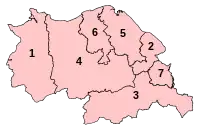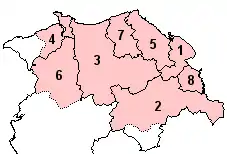Seven constituencies cover Clwyd. They are county constituencies (CCs) (for type of returning officer and election expenses) of the House of Commons of the UK Parliament (Westminster), and are used also for elections to the Senedd. The current boundaries have been effective since the 2007 National Assembly for Wales election and the 2010 United Kingdom general election.[1]
Clwyd is one of the eight preserved counties of Wales. As currently defined, the preserved county consists of the principal areas of Conwy, Denbighshire, Flintshire and Wrexham.
For Senedd elections, constituencies are grouped into additional member electoral regions, and changes to constituency boundaries mean, also, changes to regional boundaries.
Westminster boundaries
From 2010
| Constituency | Boundaries |
|---|---|
| 1. Aberconwy CC |  Parliamentary constituencies in Clwyd 2010 |
| 2. Alyn and Deeside CC | |
| 3. Clwyd South CC | |
| 4. Clwyd West CC | |
| 5. Delyn CC | |
| 6. Vale of Clwyd CC | |
| 7. Wrexham CC |
Conservative † Labour ‡
| Constituency | Electorate | Majority | Member of Parliament | Nearest opposition | Map reference above | ||
|---|---|---|---|---|---|---|---|
| Aberconwy | 44,699 | 2,034 | Robin Millar † | Emily Owen ‡ | 1 | ||
| Alyn and Deeside | 62,783 | 213 | Mark Tami ‡ | Sanjoy Sen † | 2 | ||
| Clwyd South | 53,919 | 1,239 | Simon Baynes † | Susan Elan Jones ‡ | 3 | ||
| Clwyd West | 57,714 | 6,747 | David Jones † | Jo Thomas ‡ | 4 | ||
| Delyn | 54,552 | 865 | Rob Roberts † | David Hanson ‡ | 5 | ||
| Vale of Clwyd | 56,649 | 1,827 | James Davies † | Chris Ruane ‡ | 6 | ||
| Wrexham | 49,734 | 2,131 | Sarah Atherton † | Mary Wimbury ‡ | 7 | ||
1997 to 2010
| Constituency | Boundaries |
|---|---|
| 1. Alyn and Deeside CC (Westminster) |  Parliamentary constituencies in Clwyd pre-2010 |
| 2. Clwyd South CC (Westminster) (part) | |
| 3. Clwyd West CC (Westminster) | |
| 4. Conwy CC (Westminster) (part) | |
| 5. Delyn CC (Westminster) | |
| 6. Meirionnydd Nant Conwy CC (Westminster) (part) | |
| 7. Vale of Clwyd CC (Westminster) | |
| 8. Wrexham CC (Westminster) |
The Clwyd South constituency was also partly a Powys constituency, and the Conwy and Meirionnydd Nant Conwy constituencies were also partly Gwynedd constituencies.
Proposed boundary changes
The Boundary Commission for Wales submitted their final proposals in respect of the Sixth Periodic Review of Westminster Constituencies (the 2018 review) in September 2018. Although the proposals were immediately laid before Parliament they were not brought forward by the Government for approval. Accordingly, they did not come into effect for the 2019 election which took place on 12 December 2019, and which was contested using the constituency boundaries in place since 2010.
Under the terms of the Parliamentary Voting System and Constituencies Act 2011, the Sixth Review was based on reducing the total number of MPs from 650 to 600 and a strict electoral parity requirement that the electorate of all constituencies should be within a range of 5% either side of the electoral quota.
On 24 March 2020, the Minister of State for the Cabinet Office, Chloe Smith, issued a written statement to Parliament setting out the Government's thinking with regard to parliamentary boundaries. They propose to bring forward primary legislation to remove the statutory obligation to implement the 2018 Boundary Review recommendations, as well as set the framework for future boundary reviews in time for the next review which is due to begin in early 2021 and report no later than October 2023. It is proposed that the number of constituencies now remains at the current level of 650, rather than being reduced to 600, while retaining the requirement that the electorate should be no more than +/- 5% from the electoral quota.[2]
Senedd boundaries
From 2007
| Constituency | Senedd region | Constituency boundaries |
|---|---|---|
| 1. Aberconwy CC (Senedd) | North Wales |  Senedd constituencies in Clwyd 2007 |
| 2. Alyn and Deeside CC (Senedd) | ||
| 3. Clwyd South CC (Senedd) | ||
| 4. Clwyd West CC (Senedd) | ||
| 5. Delyn CC (Senedd) | ||
| 6. Vale of Clwyd CC (Senedd) | ||
| 7. Wrexham CC (Senedd) |
The seven constituencies are all in the North Wales electoral region, which also includes two Gwynedd constituencies.
1999 to 2007
| Constituency | Assembly region | Constituency boundaries |
|---|---|---|
| 1. Alyn and Deeside CC (Assembly) | North Wales |  Assembly constituencies in Clwyd pre-2007 |
| 2. Clwyd South CC (Assembly) (part) | ||
| 3. Clwyd West CC (Assembly) | ||
| 4. Conwy CC (Assembly) (part) | ||
| 5. Delyn CC (Assembly) | ||
| 6. Meirionnydd Nant Conwy CC (Assembly) (part) | Mid and West Wales | |
| 7. Vale of Clwyd CC (Assembly) | North Wales | |
| 8. Wrexham CC (Assembly) |
Results
2019
The number of votes cast for each political party who fielded candidates in constituencies comprising Clwyd in the 2019 general election were as follows:
| Party | Votes | % | Change from 2017 | Seats | Change from 2017 |
|---|---|---|---|---|---|
| Conservative | 118,595 | 45.5% | 6 | ||
| Labour | 103,965 | 39.9% | 1 | ||
| Plaid Cymru | 15,310 | 5.9% | |||
| Liberal Democrats | 13,366 | 5.1% | |||
| Brexit | 8,816 | 3.4% | new | ||
| Greens | 445 | 0.2% | |||
| Total | 260,497 | 100.0 | 7 |
Westminster elections
| 2005 | 2010 | 2015 | 2017 | 2019 |
|---|---|---|---|---|
.png.webp) |
.png.webp) |
.png.webp) |
.png.webp) |
.png.webp) |
Assembly/Senedd elections
| 2007 | 2011 | 2016 | 2021 |
|---|---|---|---|
.png.webp) |
.png.webp) |
.png.webp) |
.png.webp) |
Historical representation by party
A cell marked → (with a different colour background to the preceding cell) indicates that the previous MP continued to sit under a new party name.
1832 to 1859
| Constituency | 1832 | 1835 | 1837 | 40 | 1841 | 42 | 1847 | 1852 | 54 | 1857 |
|---|---|---|---|---|---|---|---|---|---|---|
| Denbigh Boroughs | Madock | Jones | Mainwaring | West | Mainwaring | |||||
| Denbighshire | Myddleton-Biddulph | Bagot | Myddleton-Biddulph | |||||||
| W. Williams-Wynn | Cholmondeley | W. Williams-Wynn jnr | ||||||||
| Flint Boroughs | Glynne | → | Dundas | Williams-Bulkeley | Hanmer | |||||
| Flintshire | E. Lloyd-Mostyn | Glynne | E. Lloyd-Mostyn | Glynne | E. Lloyd-Mostyn | T. Lloyd-Mostyn | ||||
1859 to 1885
| Constituency | 1859 | 61 | 1865 | 1868 | 72 | 1874 | 78 | 1880 | 85 |
|---|---|---|---|---|---|---|---|---|---|
| Denbigh Boroughs | Mainwaring | Williams | Cunliffe | ||||||
| Denbighshire | Myddleton-Biddulph | Morgan | |||||||
| W. Williams-Wynn jnr | H. Williams-Wynn | ||||||||
| Flint Boroughs | Hanmer | Cunliffe | Eyton | Roberts | |||||
| Flintshire | T. Lloyd-Mostyn | Grosvenor | |||||||
1885 to 1918
Conservative Liberal Liberal Unionist
| Constituency | 1885 | 86 | 1886 | 1892 | 1895 | 97 | 1900 | 1906 | 06 | Jan 1910 | Dec 1910 | 13 |
|---|---|---|---|---|---|---|---|---|---|---|---|---|
| Denbigh Boroughs | Kenyon | Howell | Kenyon | Edwards | Ormsby-Gore | |||||||
| Denbighshire East | Morgan | Moss | Hemmerde | John | ||||||||
| Denbighshire West | West | → | Roberts | |||||||||
| Flint Boroughs | Roberts | Lewis | Idris | Summers | Parry | |||||||
| Flintshire | Grosvenor | Smith | Lewis | |||||||||
1918 to 1950
Coalition Liberal (1918–22) / National Liberal (1922–23) Conservative Independent Labour Liberal National Liberal (1931–68)
| Constituency | 1918 | 1922 | 1923 | 1924 | 1929 | 31 | 1931 | 32 | 1935 | 42 | 43 | 1945 |
|---|---|---|---|---|---|---|---|---|---|---|---|---|
| Denbigh | D. Davies | J. Davies | E. Davies | Morris-Jones | → | → | → | |||||
| Wrexham | Thomas | Richards | Williams | Richards | Roberts | Richards | ||||||
| Flintshire | Parry | → | Roberts | Llewellyn-Jones | → | → | Rowlands | Birch | ||||
1950 to 1983
Conservative Labour National Liberal (1931–68) Social Democratic
| Constituency | 1950 | 1951 | 55 | 1955 | 1959 | 1964 | 1966 | 1970 | Feb 1974 | Oct 1974 | 1979 | 81 |
|---|---|---|---|---|---|---|---|---|---|---|---|---|
| Denbigh | Evans | Morgan | ||||||||||
| Wrexham | Richards | Jones | Ellis | → | ||||||||
| Flintshire West | Birch | Meyer | ||||||||||
| Flintshire East | White | Jones | ||||||||||
1983 to present
Conservative Independent Labour
| Constituency | 1983 | 1987 | 1992 | 1997 | 2001 | 2005 | 2010 | 2015 | 2017 | 19 | 2019 | 21 |
|---|---|---|---|---|---|---|---|---|---|---|---|---|
| Aberconwy | Bebb | → | Millar | |||||||||
| Alyn and Deeside | B. Jones | Tami | ||||||||||
| Clwyd South West / Clwyd South (1997) | Harvey | M. Jones | S. Jones | Baynes | ||||||||
| Clwyd North West / Clwyd West (1997) | Meyer | Richards | Thomas | D. Jones | ||||||||
| Delyn | Raffan | Hanson | Roberts | → | ||||||||
| Wrexham | Marek | Lucas | Atherton | |||||||||
| Vale of Clwyd | Ruane | Davies | Ruane | Davies | ||||||||
Notes and references
- ↑ The Parliamentary Constituencies and Assembly Electoral Regions (Wales) Order 2006, OPSI website
- ↑ "Update: Strengthening Democracy:Written statement - HCWS183". UK Parliament. Retrieved 21 April 2020.